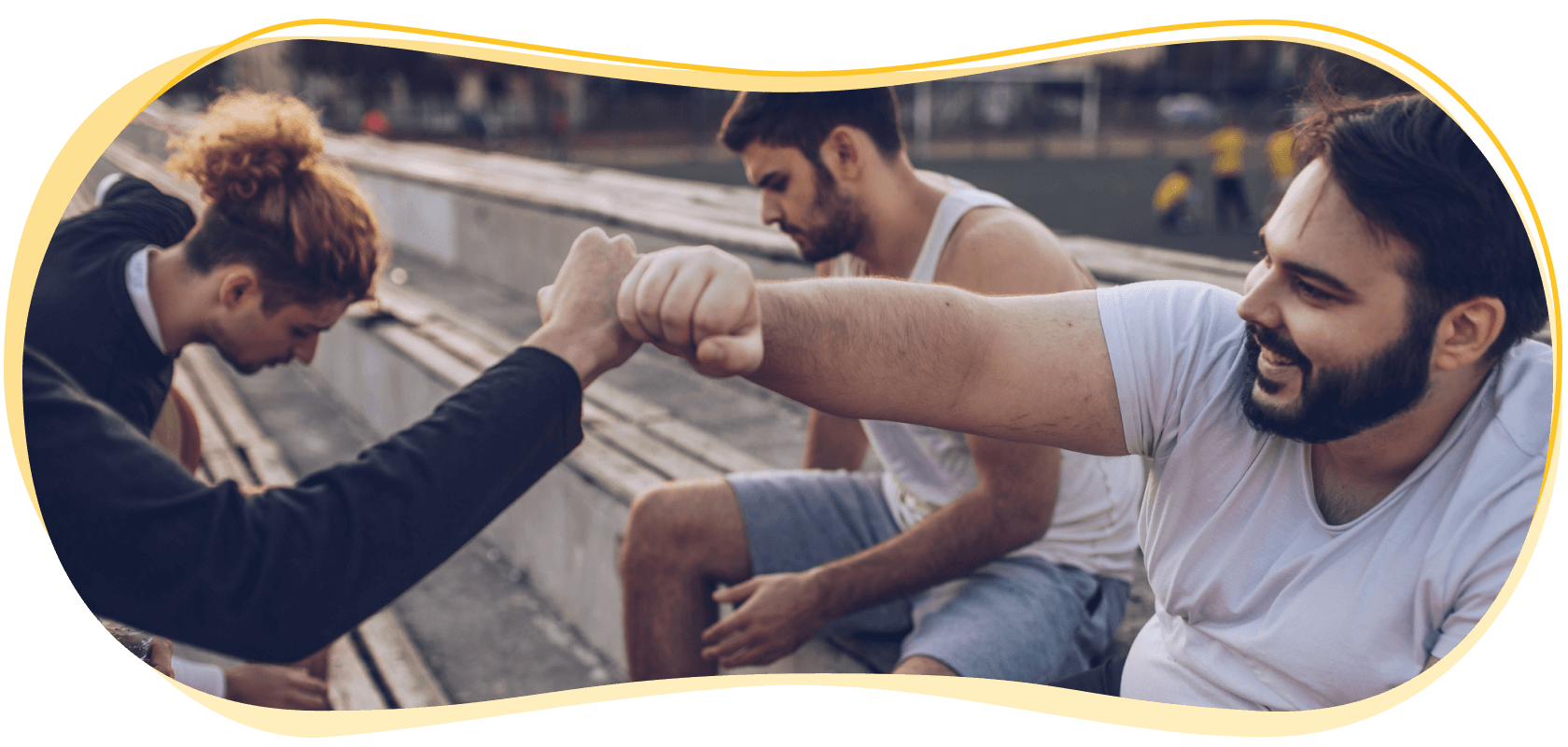Online gambling is one of the strongest predictors of gambling problems in young adults.
Minimizing Risks
Just Being You Puts You at Higher Risk
People aged 18 to 24 are more likely to engage in risky gambling behaviours. Add in being male and the likelihood rises even higher. Although you are legally an adult, the part of your brain that controls emotion and logic isn’t fully realized until you’re 24 or 25. As a result, young adults are more likely to be risk takers or to act impulsively. Plus, being away from home for the first time or earning your own money, and even maybe experimenting with other things like alcohol or drug use, can make good decision-making even more difficult.
- Online Gambling
Gambling online has a higher potential to lead to risky gambling behaviours. Being able to do it from almost anywhere makes gambling more accessible so it’s easy to do more frequently, which can also lead to issues. Gambling to get a “high” feeling can also lead to risky gambling behaviour.
- Mental Health
Mental health is a significant predictive factor of risky gambling behaviour, especially if you’re motivated to gamble because you feel anxious or depressed. That might be even more likely during COVID-19. There have been higher rates of severe anxiety and depression recorded among young adults during the pandemic.
- Family Member
Having a parent or family member with problems related to gambling puts you at higher risk of running into trouble with gambling. If you’re worried about your own – or someone else’s – gambling, you can find support here.
Things You Could Lose Besides Money
Every time you gamble, you put something at risk. Of course, whatever you bet is at risk but there are other things too. If you gamble more than you intend to, you could:
- Put your mental health at risk
- Skip work, school or other important obligations
- Put strain on your relationships with friends and family
- Put your mental health at risk
- Spend money you can’t afford to lose
The Facts Don’t Lie
Gambling while intoxicated can lead to impaired decision-making and increased risk-taking.
Players 18–20 years are significantly more likely to have chased their losses and bet more than they could afford in the past than those 21–24 years.
Gambling participation typically increases during adolescence and peaks in young adulthood, when risk for gambling problems is also increased.
60% of young people aged 18–24 have gambled.
7% of young adults have reported a gambling problem in the last 12 months, with a higher rate among men.
Being a student and young adult are both characteristics generally associated with gambling problems among sports bettors.
Ads, Ads, Ads! Click Here, Watch This, Play Now!
Has this ever happened to you? You’re scrolling (and scrolling and scrolling) on Instagram and all of a sudden you’re on a website looking at some product you don’t want or need. It was probably a funny ad that got your attention, and before you knew it, you were down a rabbit hole. That’s exactly what happens with gambling ads.
Be aware that if you already gamble, you’re even more susceptible to gambling ads. It’s sort of like when you get served up ads for stuff on social networks. You’re more likely to click on the stuff you already like. Keep an eye on how often you’re seeing gambling ads – and if you respond to them. If you want to cut back on your gambling or don’t want to see them anymore, you can always right-click and select “see fewer ads like this.” No matter what you do, consider the risk before you click.
What’s a Little Bet Between Friends?
If you gamble, there’s a good chance you’ve gambled with your friends. In fact, the majority of 16–25-year-olds do at least half of their gambling with friends. While it can be fun, it’s good to keep in mind how much your friends can influence the way you play.
You may think, hey all my friends are doing it, seems harmless enough. Or that having your friends around is like having a safety net. But your friends can influence your decisions. Remember that time your buddy, Rob, pressured you to double down and you did? Classic Rob, by the way. Well, whether you won or lost, Rob was the one playing your hand, not you. We bet he wagers more than you too. It’s common for players to feel encouraged by peers who play with higher stakes. But just because they’re betting more doesn’t mean they know more about what they’re doing. Playing with friends, especially ones who stake and spend more, can skew your view of what “normal” gambling behaviour looks like.
And did we mention peer pressure? We know, we know. You think you aren’t affected by peer pressure, but if you’re gambling to fit in or to impress your friends, it might be time to rethink your gambling decisions.
Drinking / Drug Use While Gambling
In the movies and on TV, drinking and gambling often go hand in hand. It looks like lots of fun and there are no consequences, but that’s not real life. Drinking or using drugs while gambling can lead to increased risk-taking, in other words, making decisions you might not normally make, like playing longer, placing larger, riskier bets and generally spending more money than intended.*
In fact, people with a gambling problem are significantly more likely than those without problems to report gambling while high or drunk.**
*(Curran et al., 2002; Welte et al., 2004)
**(Martins et al., 2010; Welte et al., 2004)
Some Sobering Facts
Young adults have a higher prevalence of past-month alcohol use, binge drinking, heavy drinking, and alcohol use disorder compared to those over 25 years.
Rates of past-year cannabis use are high as well, at 41% among 16–19-year-olds and 45% among 20–24-year-olds.
22–40-year-olds are also more likely than other age groups to gamble while drunk.
Video Gaming and Gambling: Two of a Kind
The line between online gambling and video gaming is blurry. Both are accessible from your phone or computer, have elements of skill and chance, and excite your brain. And gaming platforms often include gambling-like elements, like loot boxes.
Video games can have similar elements to gambling, like random chance, rewards and in-app purchases. So although gaming isn’t considered gambling (because there isn’t usually risk of losing anything of value), it still poses similar risks and consequences. And that can make good decision-making in the moment of play a challenge. Not to mention it can get you to play for much longer than you planned.
On Point: Tips for Safer Gambling Online and IRL
Unlike a night of binge watching your favourite show or hanging out in the park with friends, gambling comes with built-in risk, and the odds are, over time, you will lose more often than you win. Here are some tips to limit problems.
- Don’t gamble when you’re upset or stressed (we can’t stress this enough!)
- Online or offline, remember to limit your alcohol and drug use while gambling
- Set budget and time limits; use the tools available on mobile and internet gambling sites and at land-based casinos to help you monitor your play
- Take breaks – move around, get outside, have a snack
- Only gamble with money you have – never borrow money or use money intended for crucial things like rent or food
- Don’t try to win back what you’ve lost
- Gambling is not a way to make money, so don’t think of it as a chance to buy a car or pay tuition
- Know how the games work before you play or bet
- Stick to your budget by leaving your credit and debit cards at home
- Balance gambling with other fun activities
- Don’t depend on “good luck” strategies – they don’t increase your chances of winning
When gambling online, Look for the RG Check symbol – it means that site has features to help protect you from overly risky play. Block sites you don’t want access to or set time limits using software like Bet Blocker and GamBan.
Check Yourself
Keeping gambling safer means using lower-risk strategies when you gamble. Why not check yourself in the questions below and see how you do? Answering ‘no’ to any of them might be a sign that you may need to make different decisions.
- Do you consider gambling just one of many recreational activities you pursue?
- Do your bets stay within the limits of what you can afford? Are they reasonable and calculated?
- Do you find it easy to stop gambling?
- Do you realize that winning can be fun, but it isn’t everything?
- Do you recognize that losing can be disappointing, but it isn’t everything?
- Are you okay to not gamble even when your friends are?
- Do you avoid gambling when you feel anxious or nervous?
Better Your Odds of Finding Balance
If you think gambling is taking up more of your time than you’d like, the best thing to do is make a plan. Read through the following steps which can help.
- Delete gambling apps from your phone/tablet and desktop.
- Meet up with friends, do some yoga, or make another plan to keep busy during the times when you typically gamble (i.e.: in between classes).
- Set a firm limit on the number of times (per month, per week) you gamble and stick to it. If you find yourself unable to stop, reach out and speak to someone.
Finding Support
Is gambling affecting your mental or physical health? Or do you find that you can’t slow down or stop? There are free and confidential options for help. Find one that works for you.
Learn MoreWhat Type of Gambler Are You?

Take this short quiz and find out how your personality can affect your playing style,
and learn a few tips for what to look out for if you gamble.


